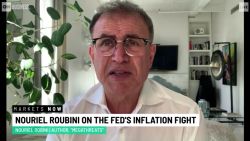The longest economic expansion in modern American history could come to a screeching halt right before the 2020 presidential election.
At least that’s what US finance leaders fear. Nearly half (48.1%) of chief financial officers in the United States are predicting the American economy will be in recession by the middle of next year, according to the Duke University/CFO Global Business Outlook survey released on Wednesday. And 69% of those executives are bracing for a recession by the end of 2020.
The report echoes previous surveys by Duke and elsewhere that point to next year as a likely trouble spot for the decadelong recovery from the Great Recession.
“We’re overdue for one of those cleansing recessions,” Duke professor John Graham said in an interview.
Graham said CFOs are growing more certain of a 2020 recession because of the paralyzing consequences of economic and political uncertainty — including trade wars — on business.
“Faced with uncertainty, companies may pause by holding off on spending and hiring. That can turn into a self-fulfilling prophesy,” he said.
Shortage of skilled workers
Next month, the US economic expansion will become the longest on record, surpassing the 1991-2001 boom that was marked by the rise of globalism and the internet. The unemployment rate is at a 49-year low.
But business executives are worried about their ability to continue hiring.
Forty-five percent of US CFOs polled by Duke said their top concern is the ability to hire and retain qualified employees. That’s down from the all-time high of 53% two quarters ago.
Not surprisingly given the labor shortage, business executives strongly back more accommodative immigration policies.
For instance, 83% of US CFOs support America offering expedited green cards to allow foreign graduate students in science, technology, engineering and math (STEM) fields to work in the United States.
Trade war trouble
Other leading concerns among executives include government policies and economic uncertainty, although those categories weren’t broken down further.
“Protectionist US trade policy remains a key risk as [the] US-China trade dispute intensifies,” Lewis Alexander, chief US economist at Nomura, wrote in a report on Tuesday.
Nomura is projecting American economic growth will decelerate to 1.6% in 2020, a sharp slowdown from 2.6% last year.
There is about a 60% chance of a recession starting in the United States by the end of next year, according to a National Association for Business Economics survey published earlier this month. Most economists in that report cited protectionist trade policy as the leading risk to the US economy.
The Fed to the rescue?
These recession prophesies could turn out to be way off the mark.
The US economy has proven remarkably resilient, overcoming countless obstacles along the way. There was the 2011 US credit rating downgrade, the 2015 slowdown in China and the 2016 Brexit vote.
It’s easy to see how these recession fears could provoke a response from Washington that allows growth to continue.
Seeking to avoid hurting the economy, the Trump administration may decide to back off tariff threats. That’s what happened last weekend when the White House abandoned its threat to impose punishing tariffs on Mexico.
Regardless what happens on the trade front, the Federal Reserve will seek to keep the economy afloat. Wall Street is betting the US central bank will soon need to lower interest rates — perhaps multiple times — to stimulate growth.
“We will act as appropriate to sustain the expansion,” Federal Reserve Chairman Jerome Powell said in a speech last week.
Waning optimism
Still, the Duke CFO survey continues to point to 2020 as the likely time the next recession will strike. The survey has been consistent about that forecast for three straight quarters.
In December, 82% of CFOs predicted a 2020 recession — a stunning finding that gained widespread attention. (That 2020 recession call has come down to 69% now).
Graham pointed to an unmistakable deterioration in sentiment among America’s finance chiefs.
Just 20% of US CFOs surveyed in June said they were more optimistic about the US economy than they were the prior quarter. And 40% said they were less optimistic.
Those metrics have reversed since last summer, when Corporate America felt much better about the outlook.
“We’ve shifted from very optimistic to a downward trend with dark clouds on the horizon,” said Graham.
























